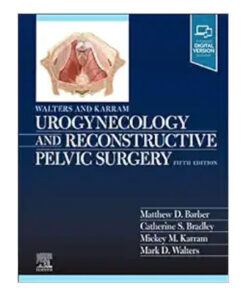Understanding the Benefits of Urologic Surgery: What You Need to Know
Learn More About Urologic Surgery
Urologic surgery is a specialized field of medicine that focuses on the urinary tract and male reproductive organs. It can involve diagnosing and treating conditions such as kidney stones, prostate cancer, bladder cancer, and urinary incontinence. If you or someone you know is considering urologic surgery, it’s important to understand the risks and benefits associated with the procedure. To learn more about urologic surgery, visit SurgeryBook.net. This website provides comprehensive information about urologic surgery, including what to expect before, during, and after the procedure. You can also find helpful resources for finding a qualified urologist in your area.
UROLOGIC SURGERY
UROLOGIC SURGERY
Pflege konkret Chirurgie Orthopädie Urologie, 6th Edition (True PDF from Publisher)
UROLOGIC SURGERY
Chirurgie de l’incontinence urinaire et du prolapsus, 2nd Edition (True PDF From Publisher)
UROLOGIC SURGERY
Male Infertility: Management of Infertile Men in Reproductive Medicine (True PDF from Publisher)
UROLOGIC SURGERY
Diagnostic Challenges in Urologic Pathology 2024 – USCAP (Videos)
UROLOGIC SURGERY
UROLOGIC SURGERY
Case Studies in Urologic Disorders (Original PDF from Publisher)
UROLOGIC SURGERY
Urologie-Néphrologie (French Edition) (True PDF from Publisher)
UROLOGIC SURGERY
Chirurgie de l’incontinence urinaire et du prolapsus, 2nd Edition (True PDF from Publisher)
UROLOGIC SURGERY
UROLOGIC SURGERY
UROLOGIC SURGERY
UROLOGIC SURGERY
Hypospadiology, Second Edition: Repairing Hypospadias Better (EPUB + Converted PDF)
UROLOGIC SURGERY
UROLOGIC SURGERY
Urologie: Réussir ses EDN, 6th edition (True PDF from Publisher)
UROLOGIC SURGERY
UROLOGIC SURGERY
Hinman’s Atlas of Urologic Surgery Revised Reprint, 4th Edition (True PDF from Publisher)
UROLOGIC SURGERY
Infections in Urology, An Issue of Urologic Clinics of North America (True PDF from Publisher)
UROLOGIC SURGERY
Bladder Pathology, 2nd edition (Original PDF from Publisher)
UROLOGIC SURGERY
UROLOGIC SURGERY
Men and Loss: New Perspectives on Bereavement, Grief and Masculinity (Original PDF from Publisher)
UROLOGIC SURGERY
Video Atlas of Hypospadias Surgery (Original PDF from Publisher)
UROLOGIC SURGERY
Ostergard’s Textbook Of Urogynecology: Female Pelvic Medicine & Reconstructive Surgery 7e (EPUB)
UROLOGIC SURGERY
A Curious Man’s Guide To Urology: Sex, Stones, Prostate Woes, And More! (Azw3+EPub+Converted PDF)
Introduction
Urologic surgery is a specialized type of medical procedure that can provide many benefits to those suffering from urological conditions. It can help improve quality of life, reduce symptoms, and even cure certain diseases. Understanding the potential benefits of urologic surgery is important for anyone considering this type of treatment. In this article, we'll discuss what you need to know about the benefits of urologic surgery and how it can help improve your health.
Overview of Urologic Surgery: Types, Benefits, and Risks
Preparing for Urologic Surgery: What to Expect
Preparing for urologic surgery can be a stressful experience, but it is important to understand what to expect before, during, and after the procedure. Knowing what to expect can help you feel more prepared and comfortable with the process.
Before the Surgery
Prior to your urologic surgery, you will likely have an appointment with your doctor to discuss the procedure and any questions or concerns you may have. During this appointment, your doctor will review your medical history and perform a physical exam. You may also need to have certain tests done, such as blood work or imaging scans.
Your doctor will also provide you with instructions on how to prepare for the surgery. This may include fasting for a certain amount of time before the procedure, avoiding certain medications, and stopping smoking if you are a smoker. It is important to follow these instructions carefully to ensure the best possible outcome.
During the Surgery
On the day of your urologic surgery, you will likely be asked to arrive at the hospital or surgical center early. You will be asked to change into a hospital gown and may be given a sedative to help you relax.
Once you are in the operating room, the surgeon will make an incision in the area that needs to be treated. Depending on the type of surgery, the surgeon may use a variety of tools, including a scope, lasers, or other instruments. The procedure may take anywhere from a few minutes to several hours.
After the Surgery
After the surgery is complete, you will be taken to a recovery room where you will be monitored until you are stable enough to go home. You may experience some pain and discomfort, which can be managed with medication.
You will also be given instructions on how to care for yourself at home. This may include taking medications, changing dressings, and avoiding strenuous activities. It is important to follow these instructions carefully to ensure a successful recovery.
Urologic surgery can be a daunting experience, but understanding what to expect can help you feel more prepared and comfortable. Be sure to talk to your doctor about any questions or concerns you may have prior to the procedure.
Post-Surgery Care: Recovery Tips and Guidelines
Post-surgery care is an important part of the recovery process. It is essential to follow the instructions given by your doctor and take all necessary precautions to ensure a successful recovery. Here are some tips and guidelines for post-surgery care:
1. Follow your doctor’s instructions: Your doctor will provide you with specific instructions on how to care for yourself after surgery. Make sure to follow these instructions carefully, as they are designed to help you heal properly and reduce the risk of complications.
2. Take medications as prescribed: Your doctor may prescribe medications to help manage pain or reduce the risk of infection. Make sure to take these medications as directed and do not skip doses.
3. Get plenty of rest: Rest is essential for healing after surgery. Make sure to get plenty of sleep and avoid strenuous activities until your doctor gives you the okay.
4. Eat a healthy diet: Eating a balanced diet can help speed up the healing process. Make sure to include plenty of fruits, vegetables, lean proteins, and whole grains in your diet.
5. Avoid smoking and drinking alcohol: Smoking and drinking alcohol can slow down the healing process and increase the risk of complications. Avoid these substances while you are recovering from surgery.
6. Exercise regularly: Exercise can help improve circulation and reduce the risk of blood clots. Talk to your doctor about what types of exercises are safe for you to do during your recovery.
7. Keep your incision clean and dry: Make sure to keep your incision clean and dry to reduce the risk of infection. Your doctor may recommend using a special ointment or dressing to protect the area.
8. Seek medical attention if needed: If you experience any signs of infection or other complications, make sure to seek medical attention right away.
Following these tips and guidelines can help ensure a successful recovery after surgery. Make sure to talk to your doctor if you have any questions or concerns about post-surgery care.
Common Urologic Surgeries: Procedures and Outcomes
Urologic surgery is a type of medical procedure that focuses on the urinary tract and male reproductive organs. It is used to treat a variety of conditions, including kidney stones, prostate cancer, bladder cancer, and urinary incontinence. Urologic surgeries can be minimally invasive or open, depending on the severity of the condition being treated.
Common urologic surgeries include transurethral resection of the prostate (TURP), radical prostatectomy, cystectomy, nephrectomy, and ureteral reimplantation. TURP is a minimally invasive procedure used to treat benign prostatic hyperplasia (BPH). During this procedure, a surgeon inserts a small tube into the urethra and uses an electrical current to remove excess tissue from the prostate. This helps reduce symptoms such as frequent urination and difficulty starting or stopping the flow of urine.
Radical prostatectomy is a more invasive procedure used to treat prostate cancer. During this procedure, the entire prostate gland is removed along with some surrounding tissue. This is usually done through an open incision in the abdomen or laparoscopically. The goal of this surgery is to remove all of the cancerous cells and prevent the cancer from spreading.
Cystectomy is a surgical procedure used to remove all or part of the bladder. This is typically done to treat bladder cancer, but it may also be used to treat other conditions such as bladder stones or severe urinary incontinence. During this procedure, the surgeon will make an incision in the abdomen and remove the bladder. Depending on the extent of the surgery, the patient may need to use a urinary catheter for several weeks after the procedure.
Nephrectomy is a surgical procedure used to remove all or part of the kidney. This is typically done to treat kidney cancer, but it may also be used to treat other conditions such as kidney stones or severe kidney infections. During this procedure, the surgeon will make an incision in the abdomen and remove the affected kidney. Depending on the extent of the surgery, the patient may need to use dialysis for several weeks after the procedure.
Ureteral reimplantation is a surgical procedure used to correct vesicoureteral reflux (VUR). VUR is a condition in which urine flows back up the ureters instead of down into the bladder. During this procedure, the surgeon will make an incision in the abdomen and reattach the ureters to the bladder. This helps prevent urine from flowing back up the ureters and causing infection.
The outcomes of urologic surgeries vary depending on the type of procedure and the severity of the condition being treated. Generally, most patients experience a significant improvement in their symptoms and quality of life following these procedures. However, there are risks associated with any type of surgery, so it is important to discuss these with your doctor before undergoing any procedure.
Understanding the Cost of Urologic Surgery: Insurance Coverage and Payment Options
Understanding the cost of urologic surgery can be a daunting task. Urologic surgery is a specialized field of medicine that deals with diseases and disorders of the urinary tract, including the kidneys, bladder, prostate, and urethra. It is important to understand the costs associated with this type of surgery so that you can make an informed decision about your care.
When it comes to insurance coverage for urologic surgery, it is important to know what your policy covers. Most health insurance plans will cover some or all of the costs associated with urologic surgery, depending on the type of procedure being performed. It is important to check with your insurance provider to determine what is covered and what is not. Additionally, some insurance companies may require pre-authorization before they will cover the cost of the procedure.
In addition to insurance coverage, there are other payment options available for those who need to pay for urologic surgery out of pocket. These include cash payments, credit cards, and financing options. Cash payments are typically the most straightforward option, as they do not require any additional paperwork or approval from the insurance company. Credit cards can also be used to pay for urologic surgery, although interest rates may apply. Finally, financing options such as loans or lines of credit may be available through banks or other financial institutions.
No matter which payment option you choose, it is important to understand the full cost of urologic surgery before making a decision. This includes the cost of the procedure itself, as well as any additional fees or charges associated with the surgery. Additionally, it is important to consider any potential complications that could arise during or after the procedure. Knowing the full cost of the surgery can help you make an informed decision about your care.
Conclusion
Urologic surgery can be a beneficial and life-changing procedure for those suffering from urological conditions. It is important to understand the risks and benefits associated with this type of surgery, as well as the potential side effects. By speaking with your doctor and researching the available options, you can make an informed decision about whether or not urologic surgery is right for you. With the right care and support, urologic surgery can help improve your quality of life and provide relief from urological symptoms.






























